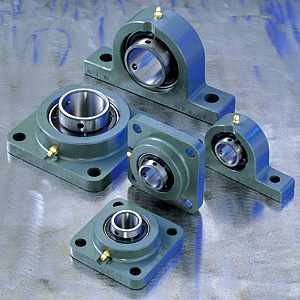Bearings
Showing all 5 results
- Bearings, Industrial Machinery, Power Transmission

Bearing Units Plastic Housing Series – NTN Corporation
Bearings, Industrial Machinery, Power TransmissionBearing Units Plastic Housing Series – NTN Corporation
The NTN plastic series ensures a clean operating environment
Units combining a resin bearing housing and stainless steel ball bearings for excellent corrosion resistance compared to cast iron units. Heat-solidifying grease (polylube) in the ball bearings provide a clean environment and lower rotational torque.
SKU: n/a - Bearings, Industrial Machinery, Power Transmission
Bearing Units Stainless Series – NTN Corporation
This new series from NTN provides corrosion resistance and longer lubrication life in a clean unit with low torque characteristics.
Units combining a stainless steel housing and stainless steel ball bearings with improved corrosion resistance over general cast iron units. Heat-solidifying grease (polylube) in the ball bearings provide a clean environment and lower rotational torque.
SKU: n/a - Bearings, Industrial Machinery, Power Transmission
Bearing Units Steel Series – NTN Corporation
NTN Rolled Steel Housings ensure a safer design
Rolled steel housings for general structures are machined with precision gas cutting, ensuring higher rigidity compared to general cast steel. Their excellent load capacity and impact resistance make them suitable for parts where safety is a concern, or where there are high vibrations or impacts.
SKU: n/a - Bearings, Industrial Machinery, Power Transmission

Bearing Units with Ductile Cast Iron Housing Series – NTN Corporation
Bearings, Industrial Machinery, Power TransmissionBearing Units with Ductile Cast Iron Housing Series – NTN Corporation
The NTN ductile series helps with design optimization.
When compared with the standard NTN housing the ductile series housing enjoys a 40% weight reduction . Additionally the housing is useful for a size reduction in machine equipment. This is achieved by minimizing as much as possible non-critical dimensions of the housing allowing the housing to be placed in tight locations.
SKU: n/a - Bearings, Industrial Machinery, Power Transmission

Triple-sealed Bearings for Bearing Units – NTN Corporation
Bearings, Industrial Machinery, Power TransmissionTriple-sealed Bearings for Bearing Units – NTN Corporation
These reliable triple-sealed bearings are dustproof and waterproof.
They ensure a longer bearing life even when exposed to heavy airborne dust and splashes of foul water.Contains a triple-lipped bearing seal for excellent dustproof and waterproof performance compared to standard bearings. This ensures a longer operating life even when subjected to dust or dirty water.
SKU: n/a
Are you looking for a Bearings product?
When selecting Bearings for your company’s needs, there are several important points to consider during the comparison and evaluation process.
1. Load Capacity
Evaluate the load-bearing capacity of Bearings. Consider the maximum loads your machinery will experience and choose Bearings that can handle these loads efficiently.
2. Durability and Lifespan
Assess the durability and expected lifespan of Bearings. Look for products with materials and design features that ensure longevity and reduced wear and tear.
3. Friction and Efficiency
Examine the friction characteristics of Bearings. Lower friction contributes to energy efficiency and less heat generation. Choose Bearings that provide smooth operation with minimal energy loss.
4. Cost and Value
Compare the costs associated with different Bearings. Consider not only the initial purchase price but also factors like maintenance costs and the overall value the Bearings bring to your machinery.
5. Maintenance Requirements
Evaluate the maintenance needs of Bearings. Bearings with minimal maintenance requirements can result in reduced downtime and lower long-term operational costs.
6. Installation and Compatibility
Ensure that the Bearings are easy to install and compatible with your existing machinery. Consider whether any modifications or additional components are needed for integration.
7. Environmental Conditions
Consider the environmental conditions in which the Bearings will operate. Factors such as temperature, moisture, and exposure to contaminants can impact the choice of Bearings.
8. Manufacturer Reputation
Check the reputation of the manufacturer. A reputable manufacturer is more likely to produce high-quality Bearings with consistent performance.

